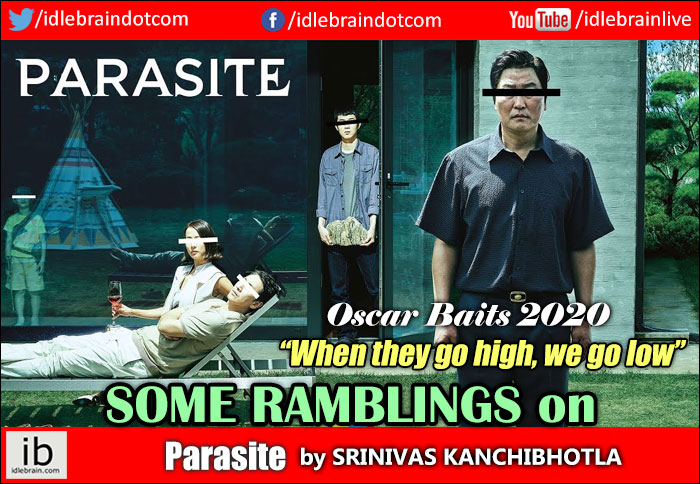
In the stage adaptation of one of the plays of master of absurd theater, Eugene Ionescu, a lady and her lover murder the husband and hide it in a room off stage. Every day the leg of the corpse grows a little slowly jutting on to the stage bit by bit to the point that by the climax the leg occupies the entire stage and pushes the actor off the stage. The actual play has the wife dragging the corpse to a river nearby and while pushing it out into the gushing river, her leg gets entangled with the corpse's dragging her into the strong current. Absurdity as this is clearly a metaphor for morality. The growing leg is a stand in for guilt and the process of pushing the actors off the stage is the eventuality in all passion crimes, the act of getting caught and relegated into oblivion. While sarcasm is merely a poke at the status quo, absurdity has the power of taking the ridicule to a whole different level, where the underlying commentary is even more horrific than the actual crime itself. Anthony Burgess' "A clockwork orange", about the reformation process of a congenital criminal where the instruments of justice try to sanitize the criminal element away from the mind of the perpetrator accidentally ending up erasing his humanity, is an absurd take on the institutional processes that tend to dehumanize the very vitality of life (as in, Charlie Chaplin's take on mechanization and automation in his very futuristic "Modern Times"). That is the power of the absurd, to peel away the mask off the reality and show it in all its grotesque glory. Joining the ranks of those great works, here is "Parasite" another absurd take on the growing class divide all over the world.
Touted to be the new tech capital of the world housing some of its most profitable companies, and home to the richest man on the planet, Jeff Bezos, the other side of Seattle shows a rampant homelessness problem, where people with modest incomes and meager means are simply priced out of their homes, priced out of their neighborhood and essentially priced out of their lives. The support system of the city, the teachers, nurses, labor, tool and tradesmen go attend to their jobs in the morning propping up the city with their essential services and return from work in the evening to retire in homeless shelters, unable to match nor catch up to the ever escalating exponential cost of living funded by the six figure salaries of the tech sector. Closer to home, the richest man in the country, Mukesh Ambani, builds the tallest single family residential building in Mumbai, Antilla, a grotesque shaped architectural mockery, overlooking the sea on one side, housing helipads, multilevel car parking spaces and other such wanton exhibition of opulence and extravagance... all that with the largest slum of the continent, Dharavi, making up the other side of the view. That he obtained the land from a board that manages an orphanage on that very site which had to be relocated elsewhere to accommodate this vulgar display of wealth, remains the cherry on the cake. "Parasite" could as well be the story of a family living in Antilla, who come to work in the grandest building in the country and go back at night to their lives in chawls.
Weaving through multiple genres, rapidly switching tone gears, 'Parasite' careens through the morality morass with the ease and expertise of a master driver at the wheel. The greatness of the movie is despite being very violent, as is the norm with Korean fare, the characters defy the stereotypical labels of 'good', 'bad', 'moral', 'corrupt' etc. In one of the particularly telling scenes, the rich characters make love fantasizing about being "low", while the poor characters, just a while before, in drunken stupor ponder about how richness irons out the wrinkles of troubles in life, rendering their lives free of malice and corruption, in that, the rich miss the color in the life of the poor, while the poor aspire to the nobility of the rich. But things are not that straightforward. When resources remains scarce and opportunities are limited, the pyramid scheme that is the structure of the society with the wide base struggling hard every waking minute of its life to keep the miniscule top from toppling over, does morality have a right to pontificate about the virtues of life as the substrata of the society go about their ways, moral/immoral, legal/illegal, ethical and otherwise, just trying to keep their head above the ever rising water? The title 'Parasite' itself enters the ambiguity territory with what starts off as the poor entering (infecting) a rich host dreaming to take it all over one day, gradually transforming into an absurdist tale of the rich living off oblivious of its place in and share of the society, making a statement that the apathy of the rich is just as dangerous antipathy of the poor. The central set piece of the movie, the torrential downpour sequence, that inundates the low lying areas of the poor causing the flooding of their homes, overflowing of their toilets, loss of their meager valuables, as the rich kid enjoys his night in the rain camped outside his sprawling yard in a waterproof tent as his mother, in an casual tone, comments that the rain was a welcome change washing away the toxicity in the sky and pollution on the ground, is the absurdity of everyday life in the modern society where the poor, in desperation, and the rich, in indifference, parasitically devour the essence of life.
Oscar Baits 2020:
1917
The Irishman
Bombshell
Once upon a time in Hollywood
checkout http://kanchib.blogspot.com for Srinivas's Blog.
